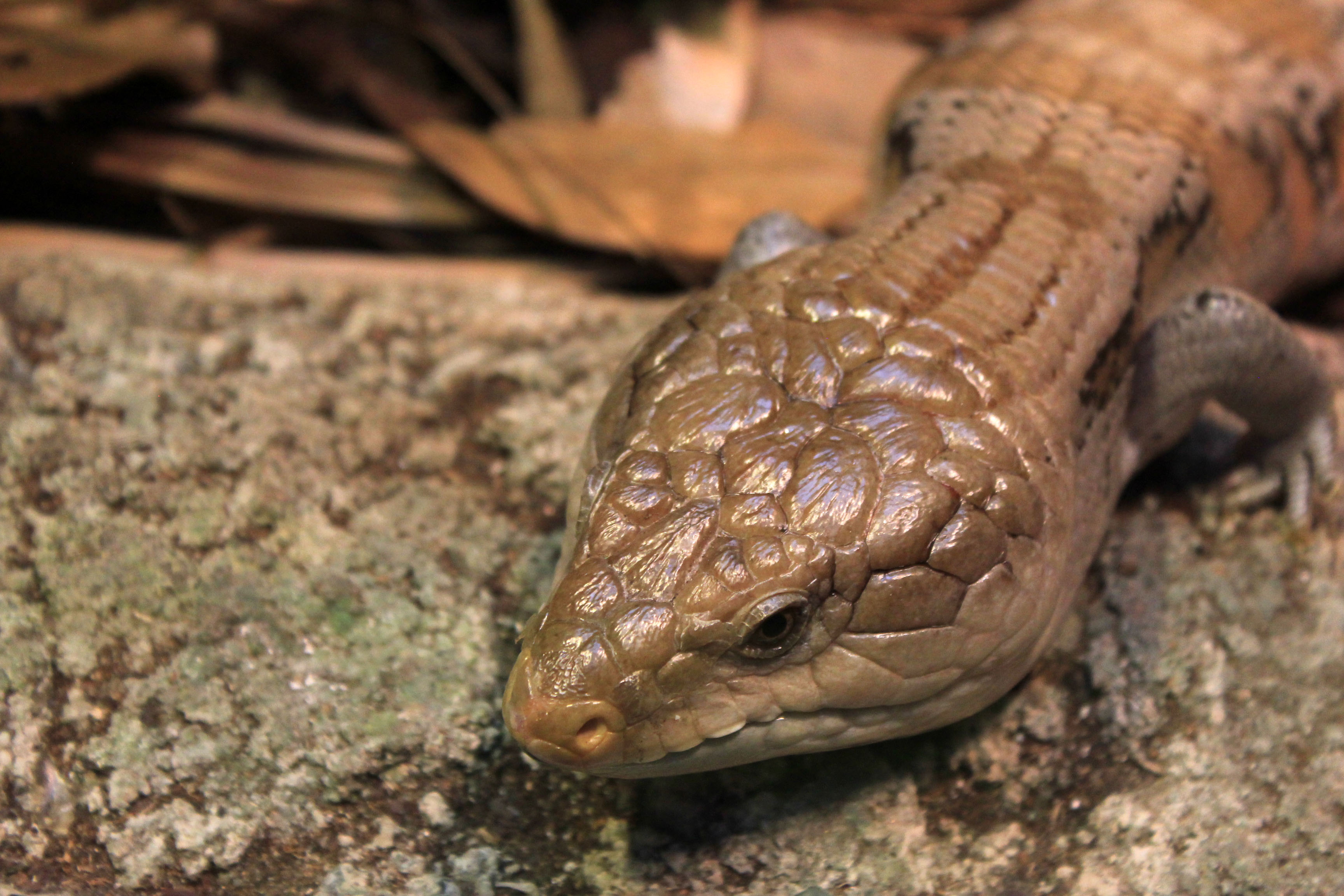Many times I’ve had blue tongue skink beginners ask how long a skink can go without food. This question always erupts when they notice that their skinks aren’t eating as they supposed to.
This can be as a result of some factors which will be discussed extensively in this article. As a blue tongue skink owner and a good one at that; some of the things you’ll have to master sooner than later are:
- Why your blue tongue skink isn’t eating,
- How long skinks can go without food and
- How to force-feed a picky eater, among others.
This article will give you the needed information and guide to better understand your skink as well as be a great breeder.
This article has been reviewed by Dr. Dilber. Read more about our knowledge control process here.
Contents
How Long A Blue Tongue Skink Can Go Without Food
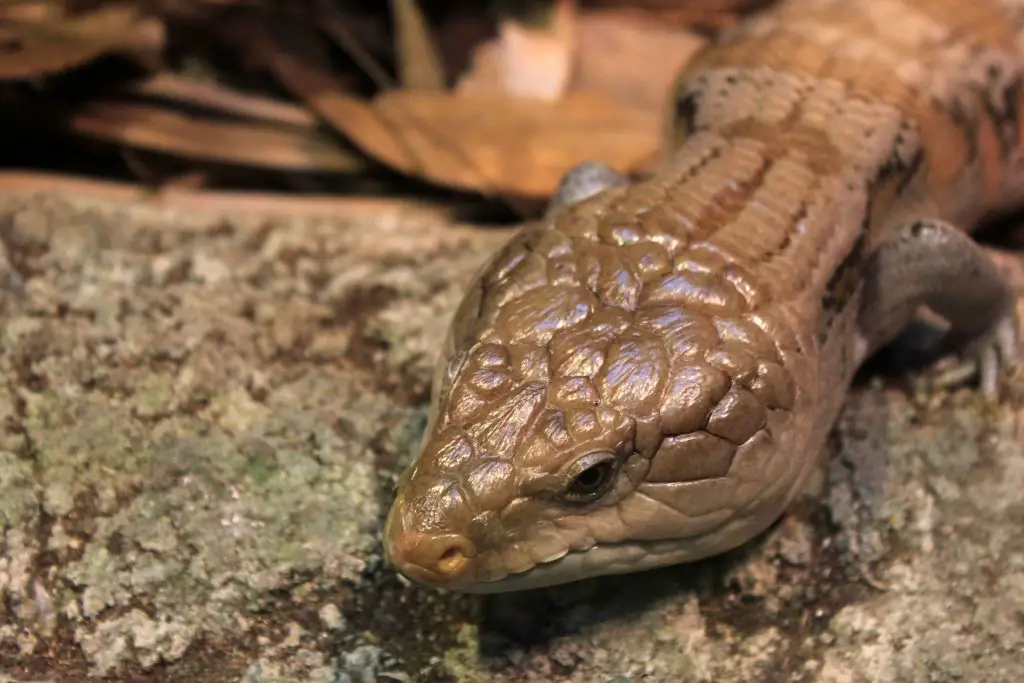
How long a blue tongue skink can go without food is a matter of some factors such as physiology, age, size, and health status. In general, blue tongue skinks can go for 3-6 months without food.
To explain the detail, the info below will give you the deeper explanation for it.
Physiologically, the body of blue tongue skinks is structured to function in a very unique way. In the wild, when there is a scarcity of food during winter, or when their appetite is suppressed for any reason; their body system will slow down to almost zero.
That way, they’ll use very little energy and will not require food. They can live like this for months without food and they wouldn’t have any health issues.
In regards to age, adult skinks can adapt better without food than baby skinks. Baby and juvenile skinks that are growing, they need to eat a lot more often to survive than already full-grown adult skinks.
Vet answer: Baby skinks cannot live long without food becausese they have very low internal fat storage. When skinks do not get food they use the internal fat storage as source of energy. More internal storage means skinks can live more days without food
For size, bigger skinks can survive for some months (3months or even more) without food. They are able to survive that long without food because of their massive body size and physiology as earlier mentioned.
The large body size translates to mean more fat deposits. More fat deposits in their system provide a good source of energy for metabolic processes, especially during hibernation period.
During this period, the body begins to draw on the fat reserves as a substrate to generate energy for catabolism.
Adult skinks can go upto 4weeks without food without altering their body normal metabolism and function. However, they can live up to 3 months without food but in such periods they become weak and suppressed.
Talking of health as a factor that determines how long a skink can go without food. This doesn’t translate to sickness. In fact, for your blue tongue skink to go months without food due to stress or brumation, it MUST be in good health.
The healthier a skink is, the longer it can live without food. Skinks that are sick or have their immune systems compromised for any reason will find it more difficult to cope with no food than the healthy and agile ones.
Check here for our article on the classification of blue tongue skinks based on region to know which one is yours.
Why Is My Blue Tongue Skink Not Eating?
To begin with, though this is a thing to worry about, be aware that to overfeed your blue tongue skink is a much bigger issue than not feeding enough, or even worse.
When you notice your skink not eating whenever you offer food, there are many reasons or factors that could be responsible for that. Let’s delve into each in detail.
1.) Your Skink Might Be Getting Ready To Brumate
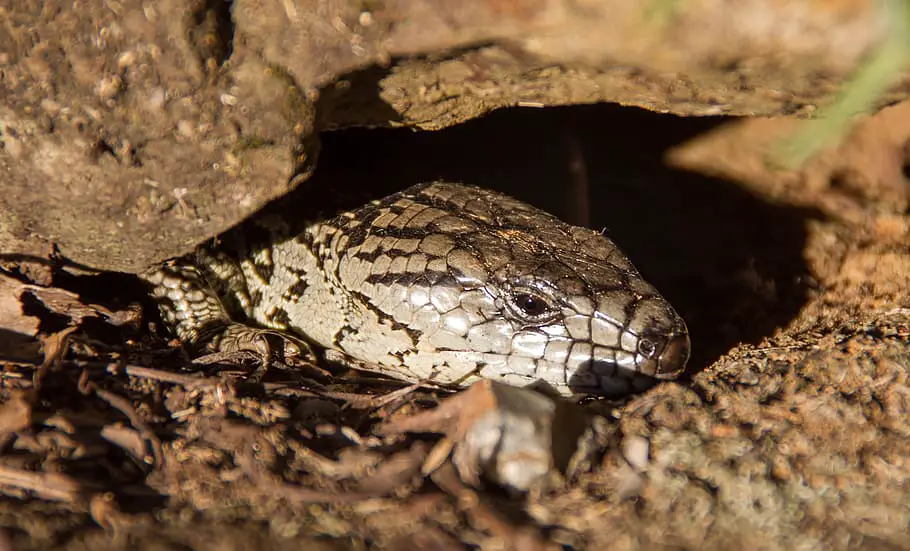
Annual brumation that usually occurs naturally around winter or fall to spring is typically going to be a major reason for your skink not wanting to eat.
In that case, this should be the first thing you should consider to possibly rule out before wondering if something else is the cause.
Since they are cold-blooded with no ability to control their body temperatures, so to survive the brutal winter seasons and extreme cold environments they’ll have to go into burrows to hibernate.
New to blue tongue skink? Check out the blue tongue skink care sheet now! We had listed out all the things you need to know about blue tongue skinks as pets. Check it now!
During this period, they are not supposed to have food in their system. The major reason they naturally eat next to nothing in colder months is that without heat they can’t digest food.
So it becomes practically difficult if not impossible for them to digest food when they are cold. And eating when they aren’t warm enough to digest properly can make them sick, or even die.
How do you know it’s brumation period? Once it’s that time of the year, aside from refusing to eat anything, they will exhibit other symptoms like hiding a lot, not basking, and grumpiness.
2.) Environmental Factors
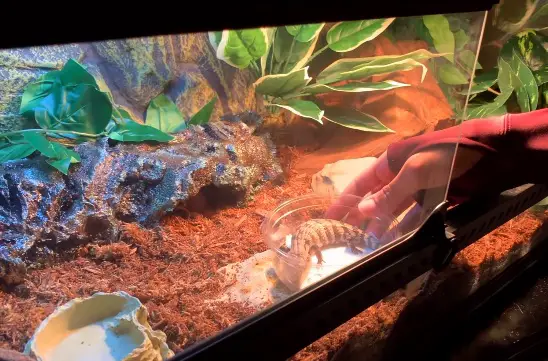
(Source: Elle’s Reptiles YouTube)
The environmental conditions of its enclosure can be a reason your skink isn’t eating. This will happen when the temperature and humidity levels aren’t appropriate or UVB supply isn’t sufficient.
As they have very slow digestive systems, enclosures with too low temperatures will slow down the digestion of food even more. Low humidity levels coupled with poor substrates can also discomfort your skink to the point of refusing to eat.
In situations where you change your environment or relocate your skinks’ cage to a new area of the house; your skinks can be disoriented. Such sudden changes and disorganization can affect their appetite and urge to consume food.
If this is the case with your skinks, it’s normal and you don’t need to panic. It happens even to humans when we change our environment.
However, when the loss of appetite persists longer than a few weeks and it’s not brumation season, that’s when you really need to be concerned. This may mean seeking the services of a professional vet.
3.) Stress
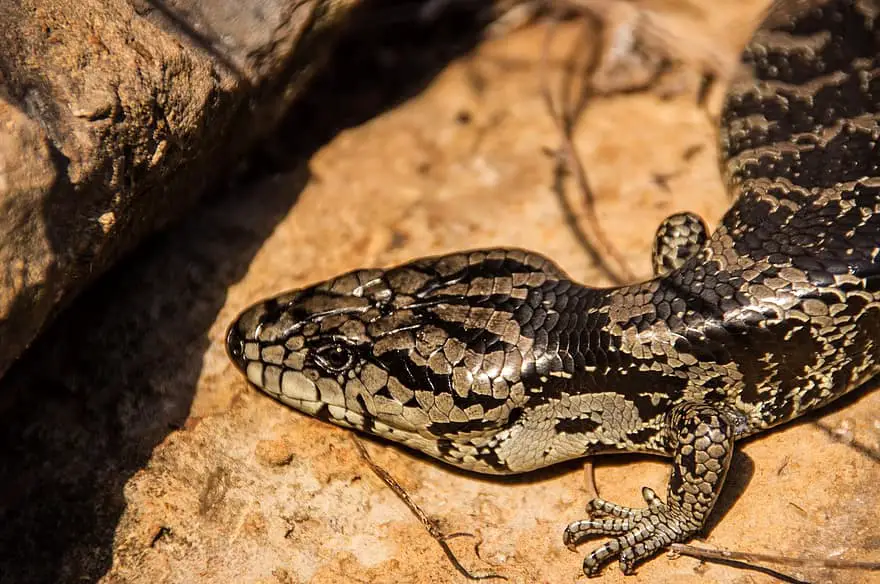
Blue tongue skink can be in stress due to Inadequate temperature, humidity, and environment of the cage. Stress suppresses the immune system ad imbalances the hormones in the body. As a result, the body’s metabolic processes get disturbed and the skink does not feel hungry.
Stressed is another reason your skinks will not have interest in eating. Your skinks can be exposed to stress via a couple of factors:
- It could be that the temperature is too low (cold) or too high (hot).
- The air is too damp or too dry.
- It can even be noise from humans or
- That too many people are handling it for too long.
In cases like this, all you need to do is to eliminate all stress factors and watch your skinks get back to normal.
Interestingly, blue tongue skinks can also be stressed if their enclosures are overcrowded either with cage enrichments or other reptiles.
However, an interview with some blue tongue skink experts shows that some skinks will be stressed if they are too lonely and do not have other skinks to relate with.
As tricky as it may be, the bottom line is, know what works perfectly for your skink and eliminate whatever factor that could constitute stress to your skinks.
4.) New Diet Or Change In Diet
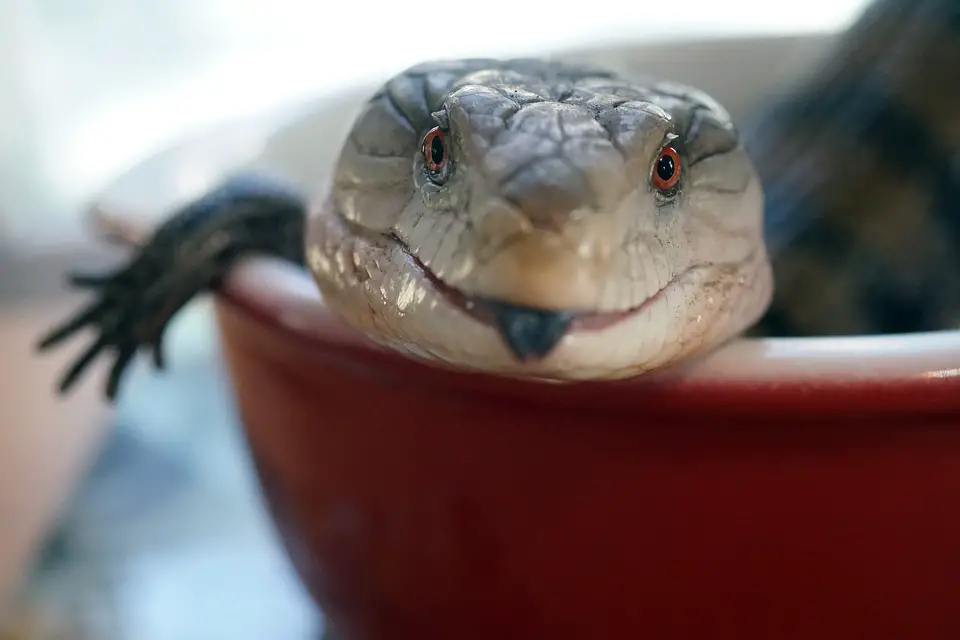
You may ask- is this possible? Let’s say you visited a close friend who’s a skink owner as well. There you noticed that his skinks seem to be more robust than yours.
You make some inquiries and find out that he offers his skinks some food you haven’t tried before on your skinks.
So here you are all excited and ready to experiment the new food idea on your skink.
In as much as they are omnivorous and can adapt to a wide variety of food, your skink is likely to reject a meal he hasn’t eaten before once he tastes it. This sometimes can go to the extent of refusing all other types of food he’s used to.
What should you do? To prevent is better and cheaper than to cure. From the very start, avoid feeding your skink with just a few types of food so that they wouldn’t end up being picky eaters.
Vet advice: Blue skinks diet should have up to 60% veggies and fruits. Feeding the same time of food to skinks makes them picky eaters. So, you should feed them a variety of foods.
If you are offering new food to the skinks, introduce it to them slowly and gradually. This way the skink will eat food and not e stressed
5.) Old Age
As hinted earlier in sections above, the rate of food intake reduces in skinks as they get older. Baby skinks and younger ones that are still growing need food more often than the adults. So the question I should ask is- How old is your skink?
Baby blue tongue skinks under 5 months old to 9 months need food 6 times a week. Semi-adults 10 months and above need to be fed 2-3 times a week. While full-grown adult blue tongue skinks will only need to be fed once or twice a week.
So it’s normal for your skink to reduce eating as it grows. Moreover, if you have had your skink since when it was a baby, you will gradually need to reduce how much food you feed it now.
6.) Shedding
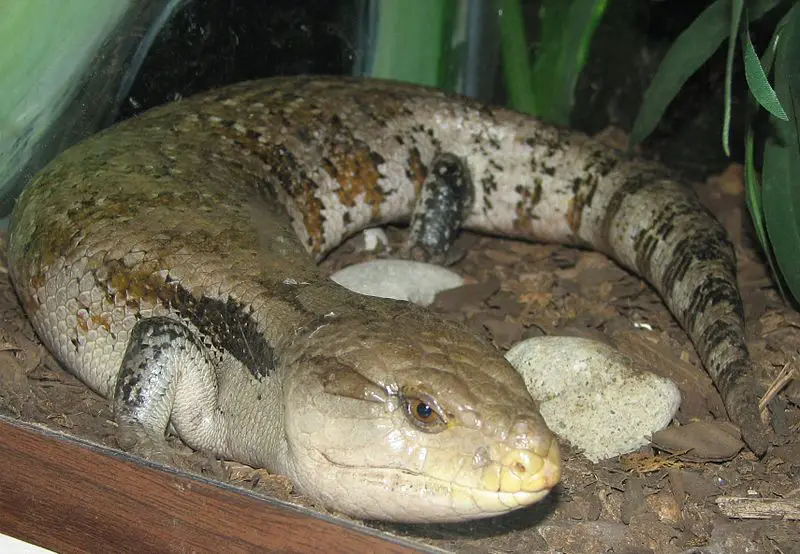
Your skink might refuse to eat when it’s about to shed. This is to some extent normal.
It’s natural and common to see skinks become fussy about eating, a few days before shedding or after shedding.
New to blue tongue skink? Check out the blue tongue skink care sheet now! We had listed out all the things you need to know about blue tongue skinks as pets. Check it now!
7.) Breeding Period
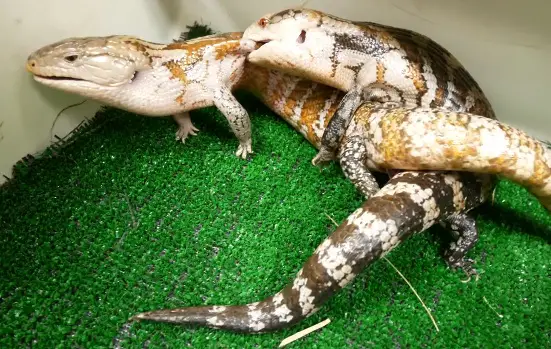
(Source: Brian Barczyk YouTube)
Sexual activity also tends to make skinks lose interest in food. This is normal and will pass once the breeding season is over.
Once your skink reaches sexual maturity at 12-16 months for males and 24-30 months for females, they will start breeding. This usually lasts for about 6 months.
8.) Illness
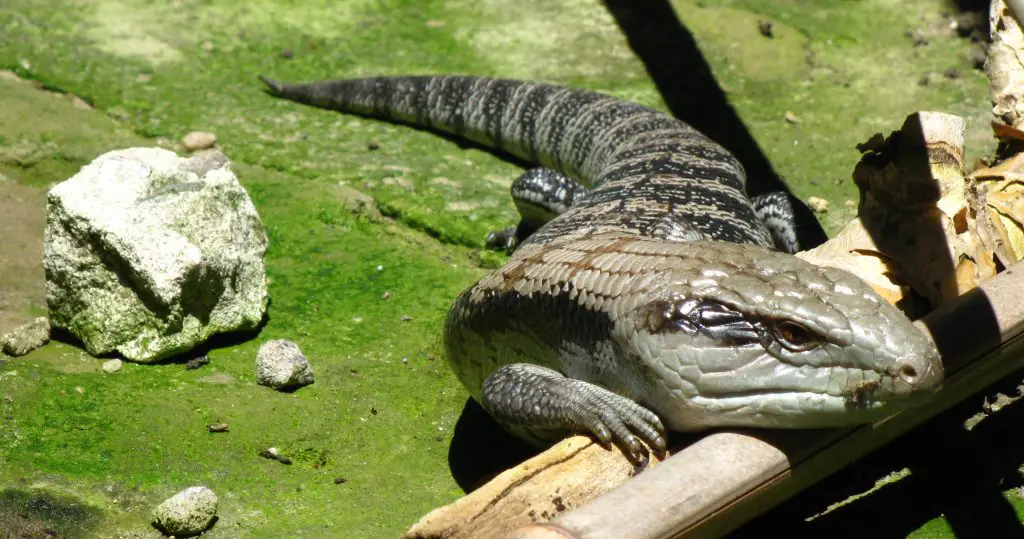
For your skink to refuse eating may also be a sign of ill health. That is if all possible factors listed above have been completely ruled out.
Illness is a major reason blue tongue skinks can lose appetite all of a sudden or over time. This is oftentimes accompanied by a number of other physical signs and symptoms like weight loss.
If your skink is just slowing down for winter because of brumation or other factors mentioned above, then it shouldn’t be losing significant weight. Because the whole metabolism of the skink will slow down completely, thereby slowing down growth rate.
However, a significant weight loss of 10% is too much to cause panic. You can always tell when your skink is losing serious weight by the condition of its tail.
Fat is stored in their tails for long-term use. So if they are really hungry or malnourished, they’ll begin to draw on the fat reserves in their tails to generate energy for catabolism. This will make the tail get skinny.
Sickness such as mouth rot and respiratory infection caused by infections and parasites are serious illnesses that will reduce your skink appetite for food.
Loss of appetite is the sign of most diseases that blue skinks suffer from. However, digestive upset, ulcers, enteritis, and respiratory infections can cause loss of appetite.
Of all the factors responsible for loss of appetite in skinks, sickness is one of the major causes and a significant one at that. If this is the case with your skink, consult an experienced veterinarian as soon as possible.
How To Force Feed A Blue Tongue Skink
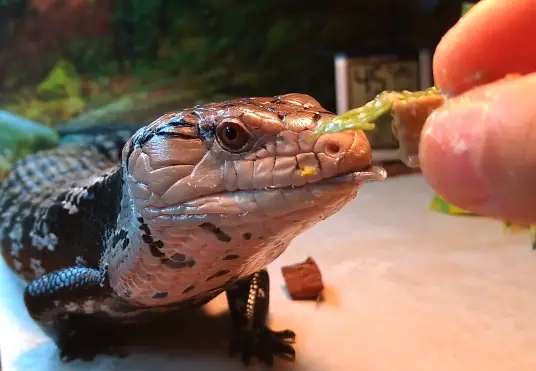
(Source: TinyTigers Den)
Despite the fact that blue tongue skinks have a wide variety of foods, they aren’t heavy or everyday eaters like dogs or humans. Coupled with the fact that by nature, they have genuine reasons for not wanting to eat.
But when skinks refuse to eat, force-feeding seems to be the very first thing bluey beginners resort to. This shouldn’t be so because it can be very dangerous.
Ideally, until you rule out that he’s not eating for medical reasons; do not force feed your skink. Rather have an appointment with a vet.
The reason is: at the process of force-feeding, something can go wrong and the skink gets choked or convulse.
However, should your skink be in good health and not eating as supposed to, or is a bit picky; here are best ways to force-feed it:
- Get an eyedropper or a little tube feeder (the type with the plunger on the end).
- You’ll need to mush up thoroughly some mealworms, crickets, or any other food you do offer it such that you’ll be able to inject it down its throat.
- Using the eyedropper or tube feeder, suck in the mashed food
- Open its mouth and inject in some food and close the mouth.
- Repeat the process till a reasonable amount of food is able to pass down the throat.
Conclusion
Animals and even humans don’t just stop eating for no reason. Same with blue tongue skinks. For your blueys it can be seasonal, or simply because they are sick.
Going by the list of reasons provided in this article, you should be able to know why your skink isn’t eating. If every seasonal factor is completely ruled out, then chances are that you have a sick skink.
So to force-feed a skink when it has internal illness would do no good but only to exacerbate more problems.
I’ll advise if your skink isn’t eating for reasons way beyond what you can explain; consult a professional veterinarian.
Moreover, if your skink loses appetite because of illness, it’s okay to isolate it from others while administering medication.
